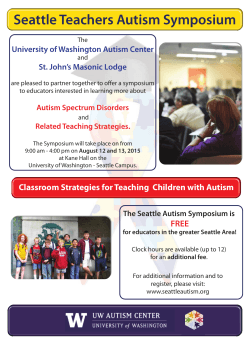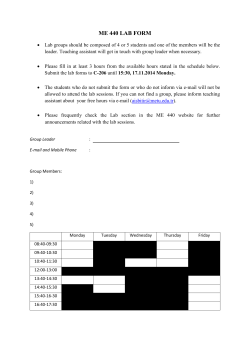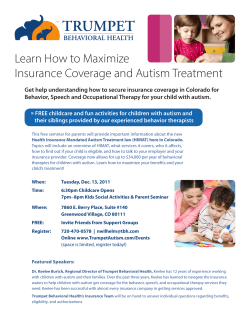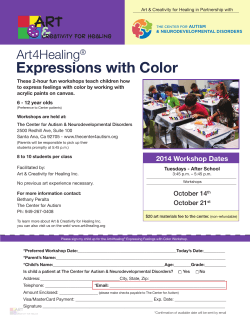
Seen and Heard - Atlantic Provinces Special Education Authority
April 2015 Seen and Heard Atlantic Provinces Special Education Authority Volume 2, Issue 2 Superintendent’s Corner As Easter approaches we look forward with excitement to some respite from winter weather… hopefully it won’t be too long in coming! Student work figures prominently in this issue, with “Olivia’s Fun FM and Hearing Aids Book” and Caelin Lloyd’s article on Goalball. Professional collaboration is the focus of Patrick Daley’s report on “Essential Learnings K-1: A Cooperative Approach” which builds on the commonalities between the Kindergarten Outcomes and the ASP. Coinciding with today being “World Autism Awareness Day” is the launch of a new online training course, with approximately 1000 registrants for the first module. Finally, the APSEA Calendar for 2015-16 is included to help facilitate our longterm planning. In the meantime, enjoy the Easter weekend! Birthday Wishes Eve Tupper, Chair of the Interprovincial School Development Association (ISDA), celebrated her 80th birthday at the time of the fall meeting. The Committee members surprised Eve with a gift of APSEA “swag” and a cake in her honour. Eve has been chairing this committee for many years and is the mother of an adult son who is Deaf. All the best to Eve and much appreciation for her many years of dedication to this Committee! Inside this issue: BRES Loves Goalball 2 Olivia’s Fun FM and Hearing Aids Book 3 Launch of New Online Training on ASD 8 Measuring Student Success 8 Essential Learnings K-1: A Cooperative Approach 9 APSEA Calendar for 2015-2016 10 BRES Loves Goalball! - submitted by Caelin Lloyd (grade 4 student) On January 19, 2015 students from grade 3-5 at Bridgetown Regional Elementary School got to try a new sport called goalball. Goalball is a unique sport that uses sound instead of sight. The goalball has several bells that notify the players on each team that the ball is coming. Players use their bodies to protect the net from the opposing team. To make it fair for all, the players wear blindfolds or as some people call them eyeshades. There are 3 players on each team and there are 2 teams. Since players cannot see the lines on the floor, they are tactually marked so the players can feel their position. You wear knee pads so your knees don’t get hurt crawling around on the floor. Peter Parsons, Yvon Clement and coach Linda MacRae Triff of the Mens Nova Scotia Goalball Team came to help us with this successful demonstration. Student Mason Smith came with Jennifer Wills (APSEA Itinerant Teacher) to help too. I first tried goalball at a camp called Brigadoon in Aylesford. Right away I knew that I would like this. My personal favourite position is centre. In the near future I hope to see an afterschool goalball program. The students at BRES loved the sport. If you have an article for a future issue of Seen and Heard, please submit to: apsea@apsea.ca Page 2 Seen and Heard Olivia’s Fun FM and Hearing Aids Book - submitted by Olivia MacLead (grade 4 student) and Susan MacLean, Itinerant Teacher (DHH) Olivia is a grade 4 student in Sydney, NS who has significantly improved her hearing aid and FM use in school this year. Her classroom teacher has worked very hard to support the use of the FM system as well as Olivia's peers in her class. They are all very encouraging and supportive and understand how much it helps Olivia to hear better in class. Olivia understands that wearing her hearing aids consistently in school and using the FM system is an expectation and now she does not require any reminders. It is a part of her daily routine that blends in very well with the rest of her day. Olivia was proud to present “Olivia’s Fun FM and Hearing Aids Book” to the class. She also thoroughly enjoyed her trip to the APSEA Centre in January, learning about her hearing loss and meeting other students with hearing loss. She again was excited to share her experience with the class. She plans to help teach her class about the ear during the upcoming Science unit on Sound in the Spring. Enjoy reading Olivia’s book! Volume 2, Issue 2 Page 3 Page 4 Seen and Heard Volume 2, Issue 2 Page 5 Page 6 Seen and Heard Volume 2, Issue 2 Page 7 Launch of New Online Training on Autism Spectrum Disorders (ASD) - submitted by Shelley McLean, Co-ordinator, Autism in Education Partnership Over the past year, APSEA’s Autism in Education Partnership, which includes the provincial autism consultants and Directors of Student Support Services from the four Atlantic Provinces, has been working on an exciting new project. Expanding on a training program that began in New Brunswick in 2011, Autism in Education has been working with NB to develop an online course for educational personnel on Autism Spectrum Disorders (ASD). The online course, “ASD and Behavioural Interventions: An Introduction for School Personnel” was launched on April 2, to mark World Autism Awareness Day 2015. The first round of training participants includes approximately one thousand teachers, resource teachers, educational assistants, and other student support services staff from all four provinces. The first course will run from April through June, 2015. “ASD and Behavioural Interventions: An Introduction for School Personnel” is offered in both English and French, and is made up of 10 elearning modules. Topics such as ASD and its impact on learning, evidence-based practice, principles of learning and behaviour, and supporting communication and social skills development are included. The Autism in Education Partnership hopes this will be a valuable professional learning opportunity that will help school personnel increase their knowledge and skills related to the strengths and needs of students with ASD. Measuring Student Success - submitted by Bert Tulk, Superintendent How to measure student success remains a challenge to educators, despite years of testing, evaluating, accountability and standards being a top priority in the US and other jurisdictions. The question is also pertinent to the education of children who are BVI and DHH. Assessment for student success is a core element in our current Strategic Plan, with implementation spanning the three year period. Last year, an inventory of Page 8 assessment instruments was completed as well as a review of the literature on best practice in assessment. This year, research on reliable measures of student success is underway. Dr. Karen Blankenship of Vanderbilt University, will prepare the BVI report, while Dr. Connie Mayer of York University will do the DHH research. These experts in the field will also recommend the most appropriate methods for measuring student success. By the end of the 2015-16 school year APSEA should have a protocol for reliably measuring student success with assessments administered efficiently and with expertise. Seen and Heard Essential Learnings K-1: A Cooperative Approach - submitted by Patrick Daley, Itinerant Teacher (DHH) A Paper once presented by Dr. Martha S. Burns, a Speech Language Pathologist, highlighted the findings by the National Institute of Child and Human Development (NICHD) which had studied reading development and reading difficulties for 35 years. In it researchers studied 10,000 children nationwide and followed some as long as 15 years. Their results indicate that up to 50% of American students find reading a formidable challenge. One study showed that 73% of children with reading problems were identified as at risk as preschoolers. Why? Because of delays in language milestones. Other studies showed between 40% and 75% of preschoolers who exhibit oral language problems will develop reading and other academic difficulties during their school years. Emergent literacy is the precursory knowledge about reading and writing that children acquire prior to conventional literacy instruction and they bring to the task of learning to read. For most children this happens within the preschool years, prior to formal schooling (Dickinson & McCabe). Early identification leads to remediation. Preventing reading failure in school-age children depends upon identification and remediation of emergent language problems in toddlers and preschool-age children. Volume 2, Issue 2 That is why more than ever a cooperative approach to teaching and remediation is needed in the classroom. If one examines the English Language Arts outcomes for K-1, it will become apparent very quickly the “Essential Learnings” of Speaking and Listening, Reading and Viewing, as well as Writing and Representing, are very similar to many of our goals as Itinerant Teachers for students who present with a hearing loss and/or subsequent language and phonologic delays. By partnering with our K-1 colleagues in the classroom, we can set common goals and objectives, while implementing Best Practice in remediation of Emergent Literacy deficits for all students. This is exactly what my Kindergarten colleague, Ms. Major and I have set out to accomplish this academic year. We practice ongoing consultative support of one another’s goals and objectives as they appear in the Kindergarten Outcomes for Language Arts and those set out in the APSEA Service Plan as designed by the Itinerant Teacher and informed by Standardized test results. Further to this common goal setting, we review language across the curriculum as well as some cross curricular mapping activities, such as the language of math. Aside from being present in her classroom twice a week, we co-teach periodically, using play based language objectives and methodology as outlined in the Language of Toys, second edition. We first recognize the value of play as a meaningful approach to enhancing and remediating phonological and linguistic challenges as they relate to emergent literacy. Patrick Daley and Ms. Major This ongoing experiment in cooperative teaching and common goal setting is already beginning to show tangible results and can actually make a Friday afternoon quite enjoyable as well. Page 9 APSEA Calendar for 2015-2016 Tuesday 1 September 2015 Monday 7 September 2015 Organization Day for Teachers Labour Day Monday 12 October 2015 Tues 20 October to Thurs 22 October 2015 Friday 23 October 2015 Thanksgiving Day APSEA Annual Inservice NSTU Provincial Inservice Wednesday 11 November 2015 Remembrance Day Friday 18 December 2015 Monday 4 January 2016 Last Working Day before Christmas First Working Day after Christmas Monday 15 February 2016 Holiday – NS & PEI Monday 7 March to Friday 11 March 2016 Monday 14 March to Friday 18 March 2016 Monday 21 March to Friday 25 March 2016 Thursday 24 March 2016 Monday 4 April 2016 March Break – NB March Break – NS March Break – PEI NL - Last Day of School (Spring Break) NL - School Reopens Friday 25 March 2016 Monday 28 March 2016 Good Friday Easter Monday Monday 23 May 2016 Victoria Day Wednesday 29 June 2016 Last Day of Classes ♦ ♦ ♦ ♦ ♦ ♦ ♦ ♦ ♦ ♦ ♦ ♦ ♦ ♦ ♦ ♦ ♦ ♦ ♦ ♦ ♦ ♦ ♦ ♦ ♦ ♦ ♦ ♦ ♦ ♦ ♦ ♦ ♦ ♦ ♦ ♦ ♦ ♦ Atlantic Provinces Special Education Authority 5940 South Street Halifax, Nova Scotia B3H 1S6 Email: apsea@apsea.ca Website: www.apsea.ca Telephone: 902-424-8500 Fax: 902-424-0543 Volume 2, Issue 2 Seen and Heard
© Copyright 2025









